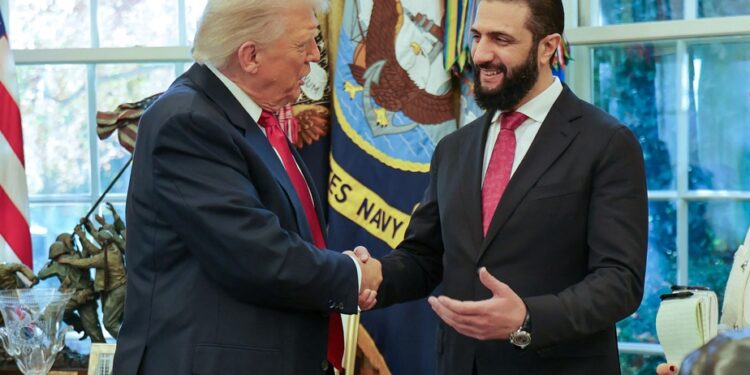(Washington) From the FBI blacklist to the White House: Donald Trump received Ahmad al-Chareh on Monday, a first for a Syrian head of state and a consecration for the former jihadist.
The State Department announced during this historic visit a new pause on US Caesar Act sanctions, pending Congress possibly lifting them for good.
The Syrian president arrived discreetly at 11:37 a.m. at the White House.
He passed through a side entrance, without the protocol usually reserved for foreign heads of state and government, whom the American president almost always comes to welcome on the steps.
Journalists were also not invited to the Oval Office in the presence of the two leaders, as is generally the case during official visits.
The leader left the scene around 1:20 p.m., and stopped for a few moments to greet supporters who were cheering him in front of the White House.
PHOTO JACQUELYN MARTIN, ASSOCIATED PRESS
Ahmad al-Chareh greeted supporters as he left the White House.
The Syrian presidency issued a terse statement, accompanied by a few photos, indicating that the two leaders had discussed “ways to develop and strengthen” the bilateral relationship, as well as “several regional and international issues”.
“Very good job”
Ahmad al-Chareh obtained a new 180-day break from the Caesar Act which imposed drastic American sanctions against the government of Bashar al-Assad, and which had already been suspended in May.
The US State Department is in favor of a complete lifting of this law adopted in 2019, which banned Syria from the international banking system and financial transactions in dollars, but this requires a vote in Congress.
Last Thursday Donald Trump, who sees himself as the great peacemaker of the Middle East, estimated that his guest was doing “a very good job” in Syria.
“He’s a tough guy. But I got along very well with him” during an interview in Saudi Arabia in May, he added.
At the time, the 79-year-old billionaire judged his 43-year-old counterpart “strong” and “attractive”.
During the visit of Syria’s interim president, whose Islamist coalition toppled longtime leader Bashar al-Assad in December 2024, Damascus was expected to sign a deal to join the U.S.-led international anti-jihadist coalition, according to the U.S. envoy for Syria, Tom Barrack.
The United States plans to establish a military base near Damascus, “to coordinate humanitarian aid and observe developments between Syria and Israel,” according to another diplomatic source in Syria.


